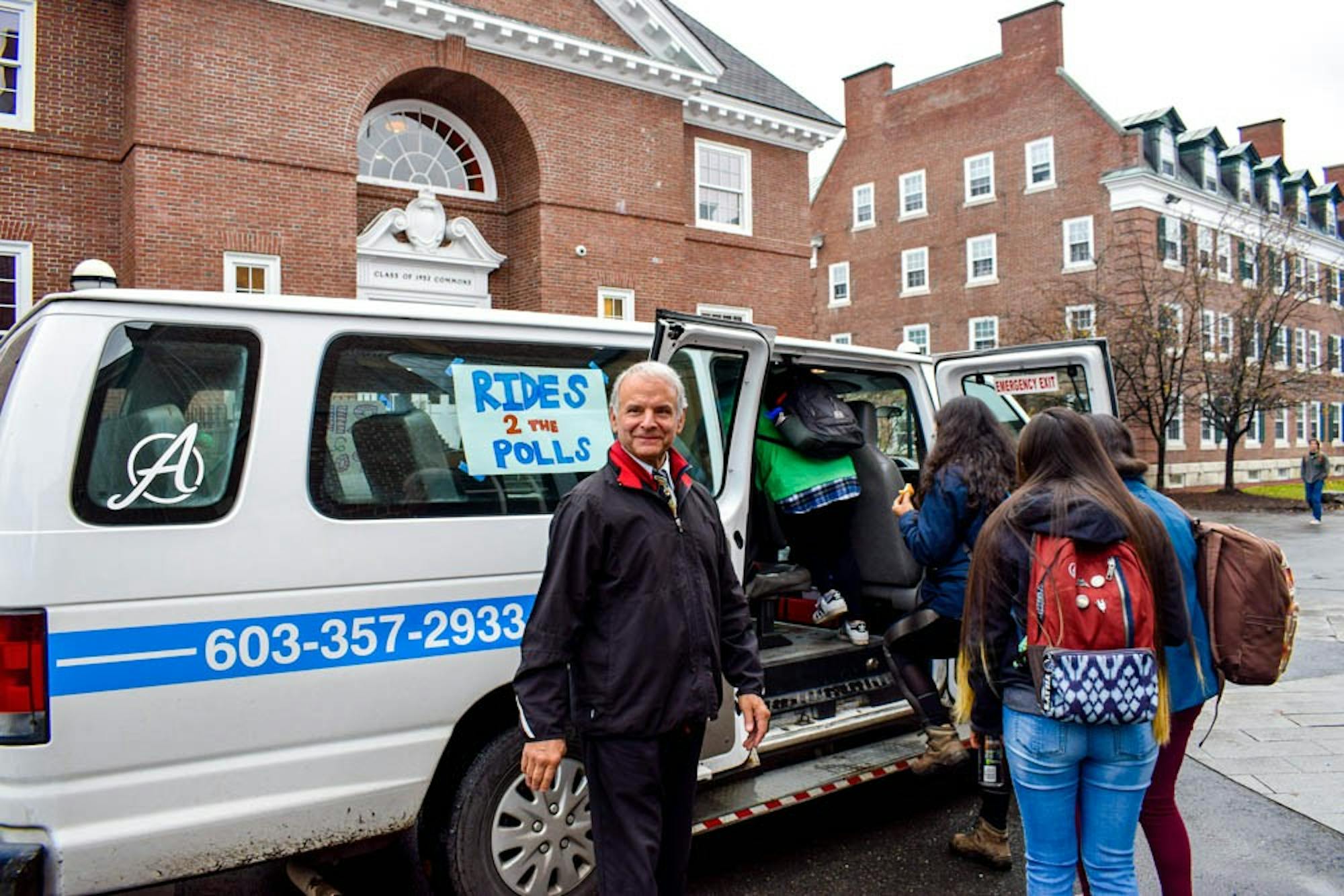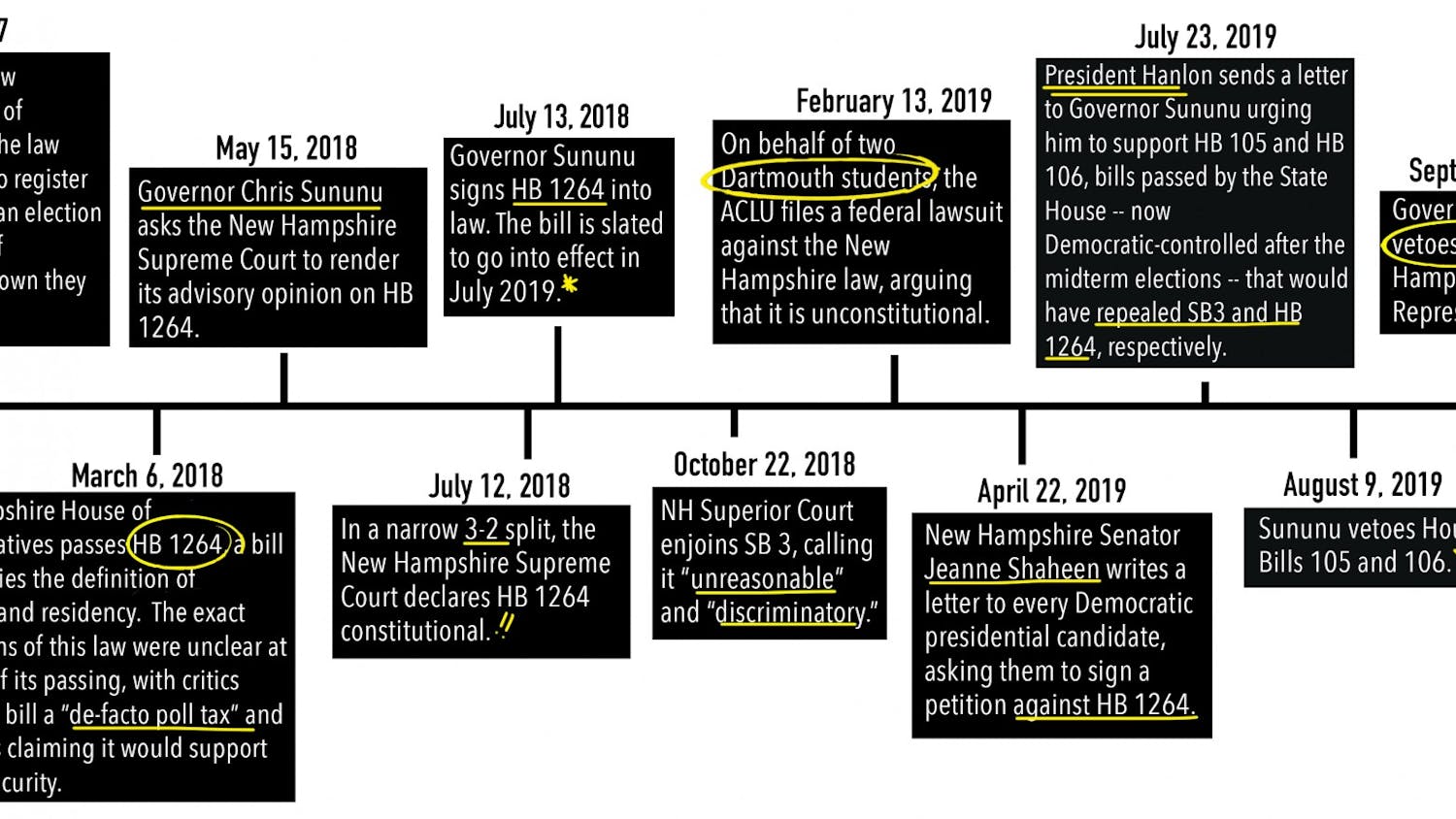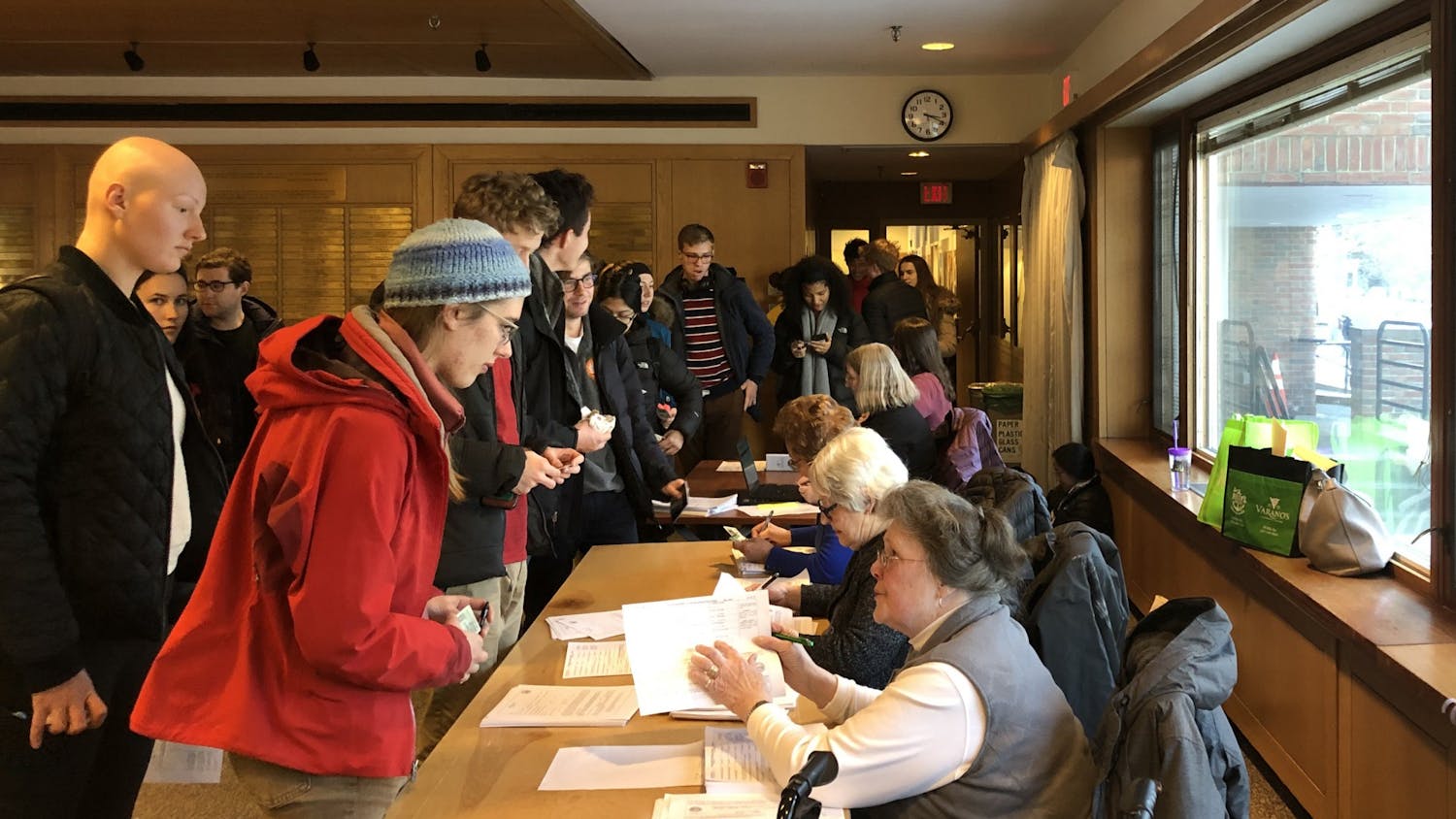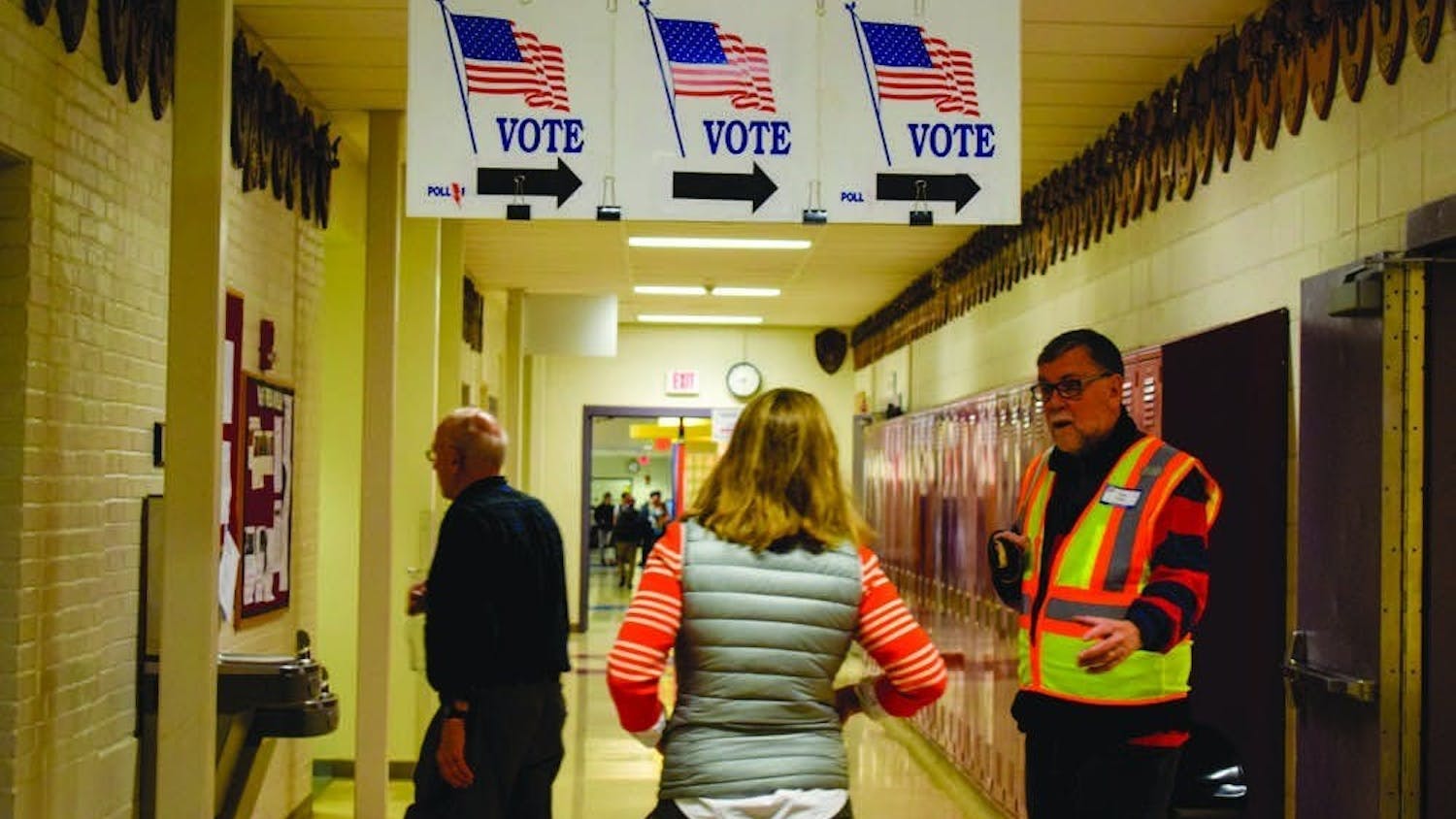On April 8, the New Hampshire Superior Court struck down Senate Bill 3, a state law modifying the definition of domicile that critics claim has created widespread confusion among student voters.
The decision, which came down in favor of the case’s plaintiffs, the League of Women Voters of New Hampshire and six individuals, deemed SB 3 “unconstitutional for unreasonably burdening the right to vote and violating equal protection under the New Hampshire Constitution.”
The law, which stated that people living in New Hampshire “for temporary purposes only” would not be considered domiciled in the state for voting purposes, was signed into effect by New Hampshire Gov. Chris Sununu (R) in July 2017. In Oct. 2018, a judge issued a preliminary injunction temporarily preventing it from affecting election practices after a judge upheld most of the law in 2017.
New Hampshire state senators and SB 3 co-sponsors Jeb Bradley (R), James Gray (R) and John Reagan (R) all said that they expect the Superior Court decision to be appealed.
New Hampshire state representative Garrett Muscatel ’20, a plaintiff in the lawsuit, called SB 3 “an attempt by the Republican legislature to stop college students from voting” by making the voter registration process “more confusing.”
Muscatel asserted that “no matter what, Dartmouth students and everybody who lives in New Hampshire has the right to vote here, and nothing can stop you from exercising that constitutional right.”
Candidate for the New Hampshire House of Representatives and former president of the College Democrats Riley Gordon ’22 echoed Muscatel’s sentiment, saying that the April 8 decision was a “big win for voting rights,” but cautioned that “that court battle is not over.”
Reagan called the Superior Court decision “just another Democrat attack on what we tried to see is a fair election process.”
According to Hanover town clerk Betsy McClain, SB 3 created “hoops” for voters to pass through in proving that they were “domiciled” in New Hampshire, which is a requirement for those registering to vote.
McClain said that prior to SB 3, those who wished to register to vote but did not have proof of domicile on hand could sign an affidavit swearing that they were domiciled in New Hampshire.
Under SB 3, McClain said that these affidavits were not an option, and voters were required to return to register at another time with proof of domicile.
McClain said that when the Superior Court struck down SB 3, the domicile affidavit was reinstated.
SB 3 and House Bill 1264, a similar bill in the New Hampshire House of Representatives, created “another step in a very tedious election closeout procedure,” McClain said.
“There’s really never been any good reason provided as to why we are [requiring additional registration steps] other than ‘state law says you have to do this,’” McClain said.
She emphasized that an out-of-state license is a valid form of voter identification, but said it “worries” her that voting laws like SB 3 and HB 1264 collect data on those who use an out-of-state license to vote. For example, she said that voting records could be used to enforce motor vehicle laws should they reveal that an individual had been using an out-of-state license for longer than the legal 60 days.
McClain said that under HB 1264 and SB 3, voting officials are directed to record out-of-state licenses but not Dartmouth IDs, passports or New Hampshire IDs. She said that although she does not know whether the information will be used for the purpose of enforcing DMV law, she “can’t think of another reason why we would need to scan in out-of-state licenses at the voter level for each contest.”
Bradley said that the intent of SB 3 was “clearly” not to deny anyone’s right to vote.
“If you’re going to vote here, you should be taking steps to become a resident,” Bradley said. “Most states have these kind of requirements. We want to encourage people to vote, but if you’re not a resident here, you ought to become a resident if you vote here. I think it’s that simple.”
In an email statement to the Dartmouth, College Republicans president Charles Schneider ’22 added that the group “staunchly support[s]” SB 3, as it “prevents voter fraud.”
Meanwhile, College Democrats president Jennifer West ’20 said that SB 3 allowed law enforcement to check in at someone’s physical address to verify whether that person lives where they said they did on their voter registration form.
“For [Dartmouth students], that’s not really possible,” West said. “Elections usually happen in November and then we’re gone for winterim, and if someone were to come check on our dorm room door to verify our residence, we might not be physically present to confirm our residence and we might have our voter registration thrown out.”
West said that SB 3 made it “more complicated and more burdensome” for students to vote and could have deterred potential voters from voting.
Maggie Flaherty ’21, a plaintiff in the ongoing ACLU lawsuit against HB 1264, said that she wants to be able to vote in New Hampshire as part of her commitment to the Dartmouth community.
“When I found out that the process by which students could vote in N.H. was being complicated and that there were unnecessary burdens being added to that process, I found that frustrating and a little upsetting,” Flaherty said.
West emphasized that the student vote in a swing state like New Hampshire can be impactful in elections and cited U.S. senator Maggie Hassan (NH-D), who won her 2016 contest by just over 1000 votes, as an example.
“Dartmouth students have a huge impact on voting outcomes, and that’s part of the reason that these voter suppression bills have been put into place,” West said.
She added that lawmakers know college students often vote Democratic, so “[t]he Republican leaders who were in charge of the New Hampshire state legislature saw that as an opportunity to restrict students’ voting rights to make sure that elections would continue to keep Republican office holders in power.”
The League of Women Voters of New Hampshire could not be reached for comment by press time.





